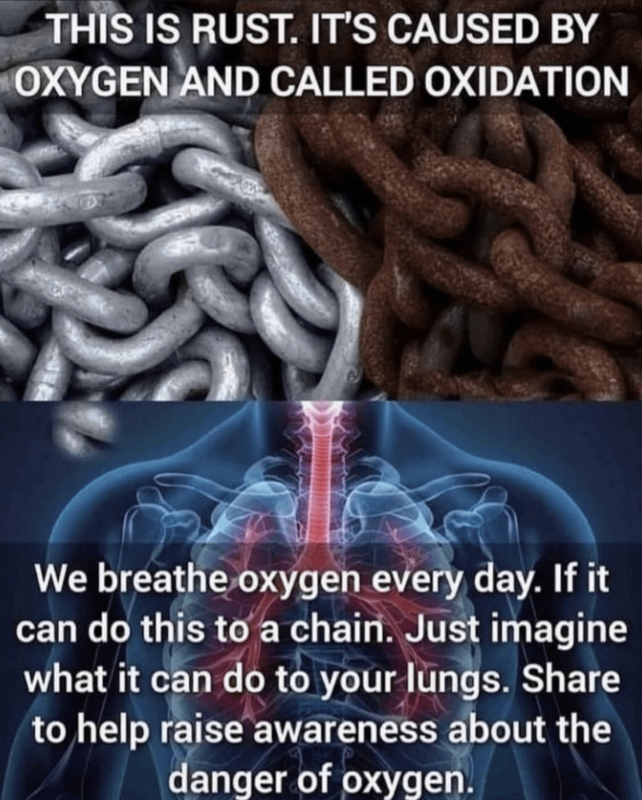Please remember to spread the word about this :(
-
This post did not contain any content.
On the topic, as oxidation is a pretty prevalent negative side effect of living, our body has multiple mechanisms to deal with it, no? So my question is: where do the "antioxidants" that we can eat come into the picture here? Are they like preventing oxidation from even occurring, or are they like the shields that our cells use to protect themselves from oxidative stress, or what have you?
-
On the topic, as oxidation is a pretty prevalent negative side effect of living, our body has multiple mechanisms to deal with it, no? So my question is: where do the "antioxidants" that we can eat come into the picture here? Are they like preventing oxidation from even occurring, or are they like the shields that our cells use to protect themselves from oxidative stress, or what have you?
wrote on last edited by [email protected]I actually thought about this a few years ago, is it possible that we age because of oxidation to some degree? Is there a way to prevent that? I thought about it, how blood can rust and just had the connecting thought but I'm not smart enough to know if there's any actual correlation.
Edit: Got some really cool responses out of this to think about, thank you everyone!
-
This post did not contain any content.
You think that's bad, wait until you hear about dihydrogen monoxide! It's in almost everything, even the water you drink and the air you breathe!
-
This post did not contain any content.

-
This post did not contain any content.
Anyone else stopped breathing here?
-
This post did not contain any content.
-
On the topic, as oxidation is a pretty prevalent negative side effect of living, our body has multiple mechanisms to deal with it, no? So my question is: where do the "antioxidants" that we can eat come into the picture here? Are they like preventing oxidation from even occurring, or are they like the shields that our cells use to protect themselves from oxidative stress, or what have you?
wrote on last edited by [email protected]Oxidation is how red blood cells collect oxygen to pass to the rest of the body. In fact it is iron in hemoglobin that "rusts" to collect the oxygen. You would die if your blood didn't "rust".
Antioxidants have nothing to do with this.
-
I actually thought about this a few years ago, is it possible that we age because of oxidation to some degree? Is there a way to prevent that? I thought about it, how blood can rust and just had the connecting thought but I'm not smart enough to know if there's any actual correlation.
Edit: Got some really cool responses out of this to think about, thank you everyone!
wrote on last edited by [email protected]Pretty sure oxidation plays a major role in aging, but can't tell you the exact mechanism, I have no idea about it.
But about the blood rust idea, I don't think that can work, cause we don't have just iron particles that can directly interact with oxygen just floating around in our blood, we have a complex (I.e. hemoglobin) that contains significant amounts of iron, which somehow makes it really good for binding to and carrying oxygen.
Deviating a bit, carbon monoxide poisoning is really akin to suffcation iirc, cause it binds and occupies the hemoglobin, effectively reducing the amount of oxygen that can be carried by your blood.
However, do fact check me, I might be wrong about something...
Edit: BTW, it seems that "oxidation" might not be the right term to use here, so do understand that I am referring to free radicals here.
-
Oxidation is how red blood cells collect oxygen to pass to the rest of the body. In fact it is iron in hemoglobin that "rusts" to collect the oxygen. You would die if your blood didn't "rust".
Antioxidants have nothing to do with this.
ooh, then I must have gotten the terms wrong...
What I was thinking were the free radicals that are generated during basically most oxygen related reactions in the body, I thought that was called oxidation (at least, in terms of the body).
So, you know anything about how (or if) antioxidants are used against free radicals?
-
I actually thought about this a few years ago, is it possible that we age because of oxidation to some degree? Is there a way to prevent that? I thought about it, how blood can rust and just had the connecting thought but I'm not smart enough to know if there's any actual correlation.
Edit: Got some really cool responses out of this to think about, thank you everyone!
I'm no expert but I'm fairly sure that is basically true in a way. As per zr0's top-level comment. Forms of life that can make do with less cellular respiration, for example by using external sources to regulate temperature (cold- blooded), don't need to invite as much oxygen into their cells, and so they get less weird damage over time.
Mammals in general have not adopted this strategy. -
This post did not contain any content.
if you haven't heard of air, it's an invisible blend of gases so addictive, we suffer fatal withdrawal symptoms within minutes of our supply being cut off
-
ooh, then I must have gotten the terms wrong...
What I was thinking were the free radicals that are generated during basically most oxygen related reactions in the body, I thought that was called oxidation (at least, in terms of the body).
So, you know anything about how (or if) antioxidants are used against free radicals?
That actually depends on the type of antioxidant. The body has certain innate antioxidants (e.g. enzymes like catalase) to deal with reactive oxygen species but antioxidants that you get through your diet are also very important in that system (like vitamin c and e to prevent oxidation of cell membranes for example). Also some phytochemicals (like polyphenols) can act as an antioxidant.
-
This post did not contain any content.
You can combat dangerous oxygen with black smoke from burning oil.
-
This post did not contain any content.
Don't forget, water is only one atom in it's molecular composition away from rocket fuel
-
This post did not contain any content.
It makes my blood run blue just thinking about it
-
This post did not contain any content.
This is why I feed blueberries to my chains
-
This post did not contain any content.
That's why I chainsmoke constantly, I have to protect my lungs from oxidation.
-
Oxidation is how red blood cells collect oxygen to pass to the rest of the body. In fact it is iron in hemoglobin that "rusts" to collect the oxygen. You would die if your blood didn't "rust".
Antioxidants have nothing to do with this.
Thanks, this is an unexpected image and a fun fact for the next party.
-
Pretty sure oxidation plays a major role in aging, but can't tell you the exact mechanism, I have no idea about it.
But about the blood rust idea, I don't think that can work, cause we don't have just iron particles that can directly interact with oxygen just floating around in our blood, we have a complex (I.e. hemoglobin) that contains significant amounts of iron, which somehow makes it really good for binding to and carrying oxygen.
Deviating a bit, carbon monoxide poisoning is really akin to suffcation iirc, cause it binds and occupies the hemoglobin, effectively reducing the amount of oxygen that can be carried by your blood.
However, do fact check me, I might be wrong about something...
Edit: BTW, it seems that "oxidation" might not be the right term to use here, so do understand that I am referring to free radicals here.
wrote on last edited by [email protected]You're pretty much right about everything. Oxygen (especially as free radicals) is damaging to pretty much all your tissues, so your body moves it around in little bodyguard proteins (hemoglobin). These each contain 4 small iron molecules as part of the much bigger structure and doesn't rust or function like iron in any way. The iron is mostly used for electrons (and also damages your body if it's not inside the hemoglobin and causes more aging)
Carbon monoxide has a higher affinity for hemoglobin than oxygen, so it sticks to your blood cells and makes them useless for hours. Super dangerous.
Point being "oxidative stress" is bad for you and a major cause of aging that your body tries to fight. If your body doesn't fix this well, you age faster. If it repairs damage too well, you're more prone to cancer. Just wear and tear of using your body.
So to the original question of can this process be stopped... Absolutely! Hold your breath - the oxygen will stop coursing through your body and you will stop aging. Just ten minutes is enough to end aging indefinitely! Then you have to worry about other problems like body decomposition, but the oxidative stress will be cured!
-
This post did not contain any content.wrote on last edited by [email protected]
Look at what it did to the Linux kernel too.
::: spoiler Tap for spoiler
Ssshhh. It made it better
:::



